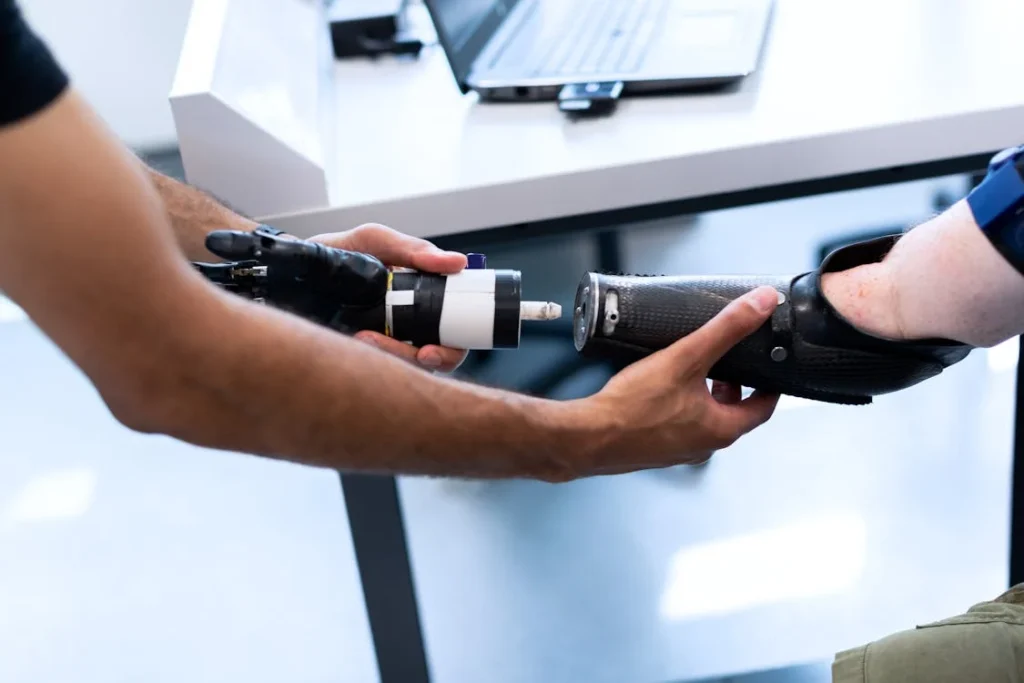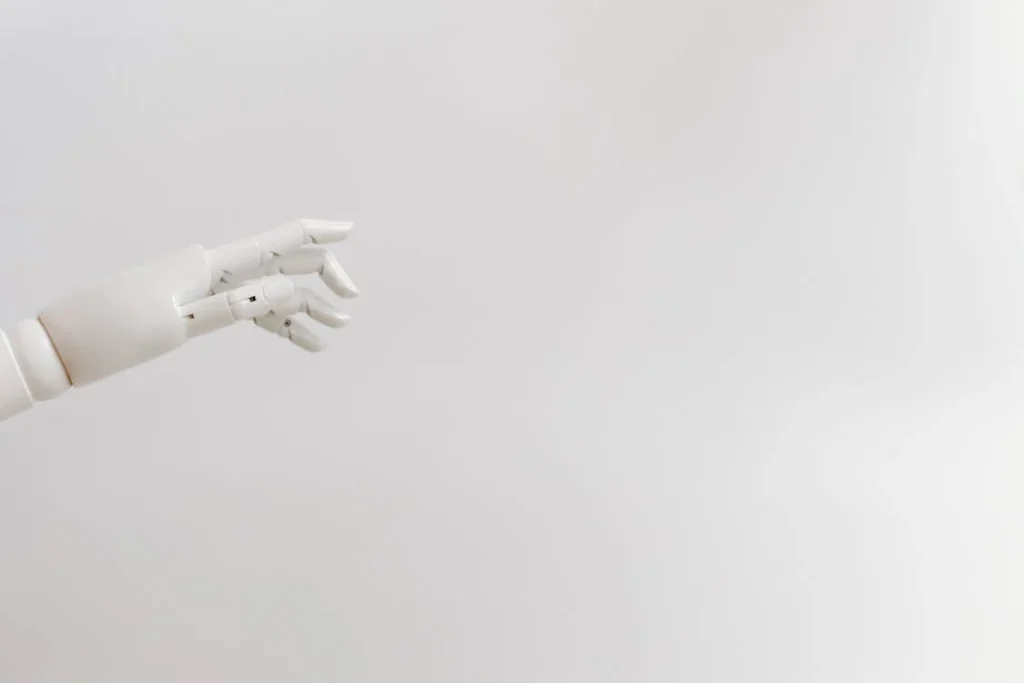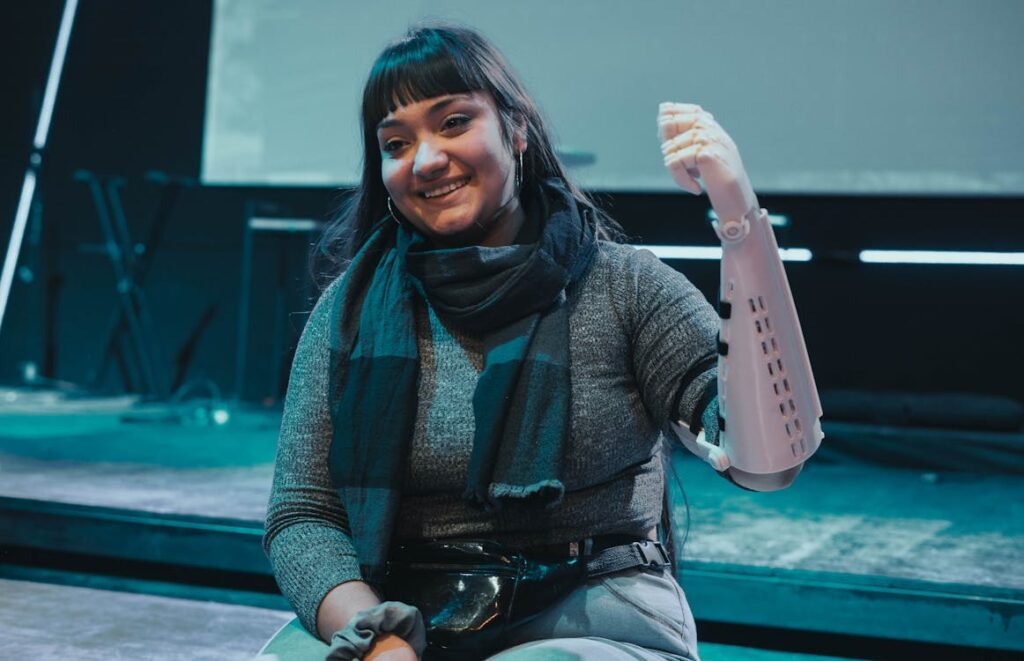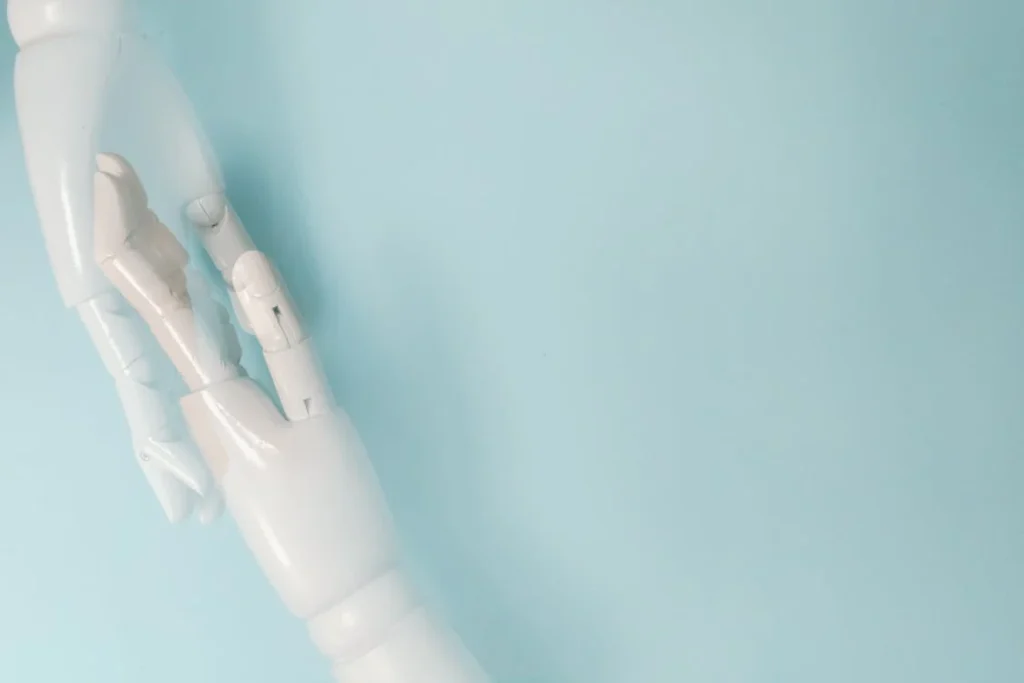Prosthetic technology has come a long way, giving people with limb loss the ability to move, work, and live independently. Yet, in many traditional societies, outdated beliefs about prosthetics still exist. These misconceptions create unnecessary barriers, making it harder for individuals with limb loss to access the care and support they need.
Some people believe that prosthetics are unnatural or that they can never fully replace a lost limb. Others think that only the wealthy can afford them or that using a prosthetic makes a person weaker. These myths are not just incorrect—they hold people back from embracing life-changing technology.
At Robobionics, we are dedicated to breaking down these misconceptions. Prosthetic limbs are not a luxury but a necessity that restores dignity and mobility. Through education, innovation, and awareness, we can help change how traditional societies view prosthetics, allowing more people to experience the benefits of modern assistive technology.

The Stigma Around Prosthetics in Traditional Societies
In many cultures, disability is often misunderstood, leading to myths and superstitions that make life harder for people who need prosthetic limbs. Some see prosthetics as unnatural, while others associate them with weakness or misfortune.
These deep-rooted beliefs can prevent people from seeking the help they need, leaving them to struggle with mobility issues when solutions are available.
The Belief That Prosthetics Are Unnatural
One of the most common misconceptions in traditional societies is that prosthetic limbs are unnatural or even “wrong.” Some communities believe that the human body should remain as it is, and any artificial addition is against nature.
In extreme cases, individuals with prosthetics may even face social exclusion or discrimination because of these beliefs.
This mindset can be harmful, especially when it prevents people from accessing life-changing technology. The truth is that prosthetic limbs are not unnatural—they are medical advancements designed to restore lost functionality.
Just as eyeglasses help people see better, prosthetic arms and legs help people regain movement and independence. Modern prosthetics, like those developed by Robobionics, are carefully designed to be lightweight, comfortable, and as close to natural movement as possible.
The Myth That Prosthetics Are Only for the Wealthy
Another widespread myth is that prosthetic limbs are only for the rich. In many rural or economically disadvantaged areas, people assume that prosthetics are too expensive and out of reach. This belief discourages individuals from even considering prosthetic solutions, even when affordable options are available.
While it is true that some advanced prosthetics can be costly, many companies, including Robobionics, focus on making high-quality prosthetic limbs at affordable prices.
Innovations like Grippy™, our 3D-printed bionic hand, are designed to be both cost-effective and functional, ensuring that more people can access the support they need.
Additionally, many governments and organizations provide funding or subsidies to help individuals get fitted with prosthetics. The key is awareness—when people know about the options available to them, they are more likely to seek help.
The Fear That Using a Prosthetic Means Admitting Weakness
In many traditional cultures, strength and self-reliance are highly valued, especially among men. This creates another barrier—people may avoid using prosthetics because they see it as a sign of weakness.
They worry that accepting a prosthetic limb means they are giving up or becoming dependent on technology.
This belief is entirely false. In reality, prosthetic limbs restore strength and independence, allowing individuals to take control of their lives again. Many athletes, professionals, and even soldiers use prosthetic limbs to continue pursuing their dreams.
The use of assistive technology is not about dependence—it is about empowerment.
The Spiritual and Superstitious View of Prosthetics
In some traditional societies, disability and limb loss are linked to spiritual beliefs. Some view prosthetics as a bad omen, while others believe that individuals with artificial limbs are cursed or bringing bad luck. These superstitions can make it difficult for individuals with prosthetics to find acceptance within their communities.
Changing these perceptions requires education and awareness. When people see the real benefits of prosthetic limbs—how they improve mobility, restore confidence, and allow people to participate fully in society—their attitudes begin to change.
Community leaders, educators, and healthcare professionals all play a role in shifting these outdated beliefs toward a more supportive and inclusive mindset.

Cultural Barriers to Prosthetic Adoption
While prosthetic technology has made incredible progress, cultural barriers in traditional societies often prevent people from seeking or using prosthetic limbs.
These barriers are not just about cost or availability—they stem from long-standing societal attitudes, family expectations, and a lack of awareness about how prosthetics can transform lives.
Family and Community Pressure
In many traditional communities, family and societal expectations dictate personal choices. When someone loses a limb, their family’s reaction can greatly influence their decision to use a prosthetic.
Some families encourage the use of assistive devices, understanding the benefits they bring. Others, however, discourage it, fearing that it will make their loved one stand out or be treated differently by society.
For example, in some cultures, people with disabilities are expected to stay at home rather than participate in work or social activities. This outdated thinking leads to isolation, limiting opportunities for education, employment, and independence.
Even if a person wants to use a prosthetic limb, they may face resistance from those around them, making them hesitant to seek help.
Changing this requires education at the community level. When people see positive examples of prosthetic users thriving—working, playing sports, and leading normal lives—they begin to question old beliefs.
At Robobionics, we actively promote awareness through outreach programs, showing communities that prosthetics are not a sign of disability but a tool for empowerment.
The Fear of Standing Out
In societies where conformity is highly valued, people with visible disabilities may feel self-conscious about using a prosthetic limb. They worry about attracting attention, being stared at, or being treated differently.
This fear of standing out prevents many individuals from embracing prosthetics, even when they could greatly improve their mobility and quality of life.
A major step in breaking this barrier is normalizing prosthetic use in everyday life. The more prosthetic users are seen in public spaces, workplaces, and schools, the more accepted they become.
Representation in media, advertising, and leadership roles also plays a crucial role. When individuals with prosthetics are seen as role models rather than exceptions, attitudes begin to shift.
Limited Access to Information
Another major cultural barrier is the lack of information about prosthetic technology. In many rural and underserved areas, people simply do not know what options are available. They may assume that prosthetic limbs are uncomfortable, difficult to use, or only meant for elite athletes and celebrities.
This misinformation prevents individuals from seeking professional guidance. Many do not realize that modern prosthetics are designed to be lightweight, functional, and easy to use.
Devices like Grippy™, our 3D-printed bionic hand, are created specifically to provide affordable and effective solutions for everyday users. When people have access to accurate information, they are more likely to explore prosthetic options and improve their quality of life.
The Role of Traditional Medicine and Healing Beliefs
In some cultures, people turn to traditional medicine or spiritual healing instead of medical solutions. While traditional healing practices hold cultural significance, they may not always provide practical solutions for limb loss.
Some individuals delay or avoid getting a prosthetic because they believe in supernatural healing or that their condition will improve over time.
Educating communities about the benefits of prosthetics does not mean disregarding traditional beliefs—it means integrating modern medical advancements into cultural understanding.
By working with local leaders, healthcare providers, and traditional healers, we can create a balanced approach that respects cultural values while ensuring that individuals with limb loss receive the best possible care.

The Psychological Impact of Myths on Prosthetic Users
Beyond the physical challenges of limb loss, the psychological effects of societal myths and misconceptions can deeply affect individuals who need prosthetic limbs.
When a person internalizes negative cultural beliefs about prosthetics, they may develop self-doubt, low confidence, or even shame. This emotional burden can be as debilitating as the physical loss itself, preventing them from fully embracing available solutions.
The Fear of Being Judged
One of the biggest mental hurdles faced by prosthetic users in traditional societies is the fear of judgment. In cultures where physical ability is closely tied to personal worth, individuals with limb loss may feel like they are constantly being evaluated.
This can make them reluctant to participate in social activities, pursue careers, or even step outside their homes.
Many people with disabilities report feeling like they must “prove” themselves to society. Instead of being seen as capable individuals, they are often viewed through the lens of their disability first.
This can lead to frustration and isolation, discouraging them from using a prosthetic limb even when it could significantly improve their quality of life.
This fear is not irrational—many traditional societies still react to prosthetics with curiosity, skepticism, or even pity. However, as more people with prosthetics step into visible roles, whether in business, entertainment, or sports, these attitudes are beginning to change.
Normalization is key, and the more society sees prosthetic users thriving, the less stigma will remain.
Internalized Stigma and Self-Doubt
Cultural myths about prosthetics can also lead to internalized stigma, where individuals start to believe the negative stereotypes about themselves.
If a society repeatedly tells them that a prosthetic limb is unnatural, that they will never function the same way again, or that they are less capable than others, they may begin to accept these ideas as truth.
This can create a cycle where people who need prosthetics avoid using them, not because they are ineffective, but because they fear that doing so confirms their “difference.” Instead of focusing on what a prosthetic limb can help them achieve, they may dwell on what they have lost.
Breaking this cycle requires strong support systems. Families, healthcare providers, and communities all play a role in reinforcing positive messages. Prosthetic users need encouragement to see their devices not as a symbol of limitation but as a tool for independence.
Psychological counseling, peer support groups, and public education campaigns can help shift mindsets, allowing individuals to see themselves in a new and empowering light.
How Positive Representation Can Shift Mindsets
One of the most effective ways to counter myths about prosthetics is through positive representation. When people see individuals with prosthetic limbs excelling in various fields—whether in the workplace, sports, or the arts—it challenges outdated beliefs.
Athletes in the Paralympics, business leaders with prosthetic hands, and public figures who confidently embrace their assistive devices all send a powerful message: prosthetics are not a limitation but a way to enhance life.
These examples show that mobility loss does not mean loss of ambition, potential, or identity.
At Robobionics, we believe that access to high-quality prosthetics is just the first step. Changing the way society views prosthetic users is equally important.
By improving awareness, fostering inclusivity, and promoting real-life success stories, we help reshape cultural narratives and empower individuals to embrace the technology that can transform their lives.

Bridging the Gap: Changing Perceptions and Encouraging Prosthetic Adoption
Overcoming myths and misconceptions about prosthetics in traditional societies requires a multi-layered approach.
Change does not happen overnight, but through education, advocacy, and technological advancements, societies can shift toward a more accepting and inclusive view of disability and assistive devices.
Education as the First Step Toward Change
Many cultural misconceptions about prosthetics exist simply because of a lack of awareness. When people do not understand how prosthetic limbs work or see them in action, they often rely on myths or outdated beliefs.
This is why education—both for individuals with limb loss and the wider community—is so important.
Public awareness campaigns can play a huge role in changing perceptions. When communities are educated about how prosthetics restore independence and mobility, they begin to see them not as unnatural but as life-enhancing tools.
Schools, healthcare providers, and media platforms can all contribute to spreading accurate information about modern prosthetic technology.
Workshops and community programs that allow people to interact with prosthetic users can also help break down misconceptions.
When people see firsthand how prosthetic limbs function—how they enable individuals to walk, work, and engage in everyday life—the stigma begins to fade.
The Role of Healthcare Professionals and Community Leaders
Doctors, physiotherapists, and rehabilitation specialists play a key role in encouraging individuals to embrace prosthetics. In many traditional societies, healthcare professionals are highly respected, and their advice is often followed.
When they actively promote the benefits of prosthetic limbs, more people are likely to consider them as an option.
Similarly, religious leaders, village elders, and local influencers have a strong impact on public opinion. If they support and normalize prosthetic use within their communities, acceptance grows much faster.
In many cultures, these figures shape social attitudes, so their endorsement of assistive technology can help remove stigma and encourage more people to seek the solutions available to them.
Making Prosthetics Accessible and Affordable
One of the biggest challenges in traditional societies is ensuring that prosthetic limbs are not just accepted but also accessible.
Many people assume that prosthetics are out of reach financially, which reinforces the belief that they are only for the privileged. To change this perception, it is essential to provide affordable, high-quality solutions.
At Robobionics, we focus on creating cost-effective, lightweight prosthetic limbs that are easy to use. Innovations like Grippy™, our 3D-printed bionic hand, prove that prosthetics do not have to be expensive to be effective.
By ensuring that assistive technology is available at a reasonable price, we help break the myth that prosthetic limbs are only for the wealthy.
Government initiatives and nonprofit organizations can also help bridge the gap by providing subsidies, insurance coverage, or donation programs for prosthetic users.
When financial barriers are removed, more people will feel encouraged to explore prosthetic solutions without fear of burdening their families.
Changing Attitudes Through Representation and Success Stories
When people with prosthetics are visible in everyday society—working, pursuing careers, engaging in sports, and participating in community life—it helps normalize their presence.
Representation matters, and seeing successful prosthetic users can inspire others to embrace assistive technology.
Athletes, artists, professionals, and entrepreneurs with prosthetic limbs are powerful examples of how disability does not limit potential. Their stories challenge negative cultural beliefs and prove that mobility loss does not mean a loss of ability.
Media outlets, documentaries, and social platforms can all contribute to sharing these positive narratives, helping to shift public perception.
At Robobionics, we believe that changing cultural perceptions is just as important as providing advanced prosthetic solutions.
Through awareness, education, and real-life success stories, we aim to create a world where prosthetics are not feared or misunderstood but embraced as tools of empowerment.

The Future of Prosthetic Acceptance in Traditional Societies
While cultural barriers to prosthetic adoption still exist, progress is being made. More communities are beginning to see prosthetic limbs not as signs of disability, but as tools for independence and empowerment.
As technology advances and awareness spreads, traditional societies are slowly shifting toward more inclusive attitudes.
Technology as a Catalyst for Change
The evolution of prosthetic technology is playing a crucial role in breaking down myths and misconceptions. In the past, prosthetic limbs were often bulky, uncomfortable, and difficult to use.
This reinforced the belief that they were ineffective or impractical. However, modern prosthetics are lightweight, functional, and in some cases, even superior to natural limbs in strength and endurance.
Bionic hands like Grippy™ by Robobionics offer natural movement, allowing users to perform everyday tasks with ease. Prosthetic legs now come with advanced shock absorption, giving users the ability to walk, run, and even engage in sports.
As these technologies become more widely known, they help dismantle the perception that prosthetic limbs are a poor substitute for real ones.
Another major advancement is 3D printing, which has made it possible to create affordable, customized prosthetics for individuals in low-income communities.
This is particularly important in traditional societies where cost has long been seen as a barrier. With locally manufactured prosthetic solutions, access is improving, and more people are realizing that these devices are within their reach.
Shifting the Narrative Through Social Inclusion
Beyond technology, social acceptance plays a key role in changing perceptions. When prosthetic users are actively included in workplaces, schools, and public spaces, it helps normalize their presence.
Instead of being seen as “different,” they become recognized for their skills, talents, and contributions.
Workplaces that actively hire individuals with disabilities send a strong message to society that prosthetic users are just as capable as anyone else.
Schools that integrate inclusive education help young students understand from an early age that disability is not a limitation. Public events, sports competitions, and advocacy campaigns that showcase prosthetic users further reinforce the idea that they can lead full, active lives.
Government Policies and Support Systems
For true change to happen, cultural acceptance must be backed by strong policies. Governments that invest in disability inclusion programs help ensure that people with limb loss have access to the prosthetic technology they need.
Financial assistance, insurance coverage, and employment incentives for businesses that hire prosthetic users all contribute to long-term societal change.
In some countries, legislation requires public spaces and workplaces to be accessible to individuals with disabilities. However, in traditional societies where such policies are still developing, advocacy efforts are needed to push for these changes.
Stronger laws and better enforcement can accelerate the process of normalizing prosthetic use and breaking down barriers.
A Future Without Stigma
The future holds promise for greater prosthetic acceptance in traditional societies. As education, technology, and social inclusion improve, the myths and misconceptions surrounding prosthetics will continue to fade.
The goal is a world where no one hesitates to use a prosthetic limb because of outdated cultural beliefs.
At Robobionics, we are committed to making this future a reality. By developing advanced, affordable prosthetic solutions and promoting awareness, we aim to empower individuals to live without limitations.
True progress happens when prosthetic users are not defined by their condition but by their strength, resilience, and ability to thrive.

The Role of Religion and Cultural Beliefs in Prosthetic Acceptance
In many traditional societies, religious and spiritual beliefs shape how people perceive disability and prosthetics. While some belief systems encourage care and support for individuals with disabilities, others view limb loss as a form of divine punishment, karma, or a spiritual lesson.
These interpretations influence whether individuals seek prosthetic solutions or avoid them out of fear or stigma. Understanding these cultural perspectives is essential to promoting acceptance and encouraging prosthetic adoption.
Religious Interpretations of Disability and Prosthetics
Throughout history, different religions have approached disability in unique ways. In some traditions, physical impairments are seen as a test of faith, a path to spiritual growth, or a challenge meant to inspire others.
While this perspective can provide comfort, it can also discourage individuals from seeking medical interventions like prosthetic limbs, as they may feel their condition is meant to be endured rather than addressed.
In other religious contexts, prosthetics may be fully accepted as tools that restore wholeness and allow individuals to fulfill their roles in society.
Some cultures see medical advancements, including prosthetic technology, as gifts from the divine—ways to help people overcome their challenges.
In these societies, the use of prosthetics is not only encouraged but sometimes celebrated as a triumph of human ingenuity and resilience.
However, in more conservative or isolated communities, there may be resistance to artificial limbs. Some believe that prosthetics interfere with the natural order of life, while others worry about how they align with spiritual beliefs regarding the human body.
These attitudes can lead to hesitation in using prosthetic limbs, even when they offer a clear path to improved quality of life.
Overcoming Religious and Spiritual Stigma
One of the best ways to address religious concerns about prosthetics is through dialogue with spiritual and community leaders. When religious figures support and endorse prosthetic use, it can significantly influence public perception.
Many respected religious leaders have spoken in favor of medical advancements, helping communities see prosthetics as a positive and acceptable solution.
Incorporating prosthetic awareness into religious teachings, community discussions, and public sermons can help shift perspectives.
When prosthetic users share their experiences within faith-based communities, it personalizes the discussion and helps people understand the real impact of these devices on everyday life.
Additionally, highlighting historical and religious figures who overcame physical disabilities can serve as powerful examples. Many cultures have stories of warriors, scholars, and spiritual leaders who lost limbs but continued to make significant contributions to society.
Drawing parallels between these stories and modern prosthetic users can help communities see prosthetics in a more positive light.
Cultural Rituals and Prosthetic Use
In some traditional societies, rituals and customs related to the human body can complicate prosthetic acceptance.
Funeral traditions, purification rites, and ancestral beliefs may include specific rules about the body, leading to concerns about whether prosthetic limbs align with these practices.
Some individuals worry that wearing a prosthetic will affect their ability to participate in religious ceremonies or family traditions.
Addressing these concerns requires education and cultural sensitivity. Instead of dismissing these beliefs, healthcare professionals, prosthetic manufacturers, and community leaders can work together to provide reassurances that prosthetic use does not interfere with spiritual identity.
Creating awareness that prosthetic limbs are not replacements but extensions of the body can help bridge the gap between tradition and modern medical advancements.
At Robobionics, we respect the diverse cultural and religious beliefs surrounding prosthetic use. Our mission is not just to provide advanced prosthetic solutions but to ensure that every individual feels comfortable and empowered in their journey toward mobility and independence.
Conclusion
Prosthetic technology has the power to restore independence and transform lives, yet myths and misconceptions in traditional societies continue to create unnecessary barriers. Cultural beliefs, social stigma, religious interpretations, and misinformation often discourage individuals from seeking prosthetic solutions, limiting their opportunities for mobility and inclusion.
However, change is possible. Through education, community engagement, and positive representation, societies can shift toward a more accepting view of prosthetic use. When people see prosthetic users thriving in workplaces, sports, and daily life, the outdated perception of disability as a limitation begins to fade.
At Robobionics, we are committed to making prosthetics not only accessible and affordable but also widely accepted. By breaking down misconceptions and fostering a culture of empowerment, we aim to create a world where no one hesitates to embrace prosthetic technology due to societal beliefs. The future is not about overcoming disability—it is about removing barriers so that every individual has the chance to live life to the fullest.



